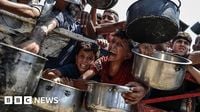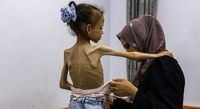The Gaza Strip is currently experiencing what experts describe as the "worst-case scenario of famine," with mounting evidence of widespread starvation, malnutrition, and disease driving a surge in hunger-related deaths. This dire situation has unfolded amid nearly 22 months of relentless conflict and a crippling blockade imposed by Israel, which controls all entry points to the territory.
On July 29, 2025, the Integrated Food Security Phase Classification (IPC), the leading international authority on food crises, issued a stark alert warning that Gaza is on the brink of famine. While the IPC stopped short of formally declaring famine—pending further analysis—the data it presented paints a grim picture. The report indicates that two of the three famine thresholds have been met: plummeting food consumption across most of Gaza and acute malnutrition, particularly in Gaza City where nearly 17 percent of children under five are severely malnourished.
Famine classification requires confirmation of three criteria: at least 20 percent of households experiencing extreme food shortages, 30 percent of children aged six months to five years suffering acute malnutrition, and a daily death rate of at least two people or four children per 10,000 due to starvation or malnutrition-related diseases. While the third criterion remains difficult to verify due to collapsing health systems, mounting evidence suggests that hunger-related deaths are rising rapidly.
According to Gaza's Health Ministry, at least 147 people have died from malnutrition since the war began, including 88 children, with recent weeks seeing a sharp increase in these deaths. Hospitals report a surge in hunger-related fatalities among children under five, intensifying fears of an escalating humanitarian catastrophe.
UN Secretary-General António Guterres described the situation as "a humanitarian catastrophe of epic proportions," emphasizing that "the trickle of aid must become an ocean." The United Nations and humanitarian agencies have repeatedly called for an immediate and permanent ceasefire, full humanitarian access, and the restoration of essential services including health, water, and sanitation.
Since March 2, 2025, Israel has imposed a near-total blockade on Gaza, cutting off food, medicine, fuel, and other vital supplies to pressure Hamas, which controls the enclave. While some restrictions were eased in May, aid deliveries have been insufficient, chaotic, and often obstructed or looted. Criminal gangs reportedly intercept and resell aid at exorbitant prices, exacerbating the suffering of the population. For example, residents have reported paying as much as $35 for a kilogram of flour, a desperate cost for many families.
In response to international pressure and growing global outrage, Israel announced in late July a series of "tactical pauses" in military operations in key population centers to facilitate aid distribution. Over 200 trucks of aid, four fuel tankers, and 20 pallets of supplies were reportedly delivered on July 28, 2025, and airdrops conducted by Jordanian and Emirati planes began. However, aid agencies caution that these measures are insufficient and that the humanitarian pauses must be extended and fully implemented to have meaningful impact.
Ross Smith, director of emergencies at the UN World Food Programme (WFP), stated from Geneva that despite these pauses, the WFP is receiving only about half of the aid volumes requested. "We are not going to be able to address the needs of the population unless we can move in the volume that we need," he warned, highlighting the urgent need for unimpeded humanitarian access.
Cindy McCain, head of the WFP, underscored the urgency: "People are already dying of malnutrition, and the longer we wait to act, the higher the death toll will rise. We need to flood Gaza with large-scale food aid, immediately and without obstruction, and keep it flowing each and every day to prevent mass starvation." She also stressed the need for medicines, health supplies, water, and specialized nutrition products to treat malnutrition.
Humanitarian workers on the ground bear witness to the crisis. Rachel Cummings, humanitarian director for Save the Children International, described scenes of extreme malnutrition in clinics, with children and adults visibly wasting away. "This is what we've been seeing for quite some time," she said, warning of an exponential rise in deaths if urgent action is not taken.
The IPC's alert, which is based on data available through July 25, 2025, reveals that more than 33 percent of Gaza's population goes an entire day without food, and global acute malnutrition rates have quadrupled in Gaza City between May and July. The Famine Review Committee, an independent body that vets IPC findings, endorsed the alert, noting that starvation, malnutrition, and mortality are rapidly accelerating despite severe data collection challenges caused by restricted access.
Meanwhile, Israel's government denies any policy of starvation, with Prime Minister Benjamin Netanyahu calling reports of famine a "bold-faced lie." His office accused Hamas of distorting casualty figures and diverting humanitarian aid, although internal U.S. government analyses have found no evidence of systematic theft of aid by Hamas. Israeli Foreign Minister Gideon Saar stated that Israel has facilitated the entry of 5,000 aid trucks over the past two months and continues to work with international agencies to ensure humanitarian assistance reaches Gaza.
However, residents in Gaza report little improvement. Many aid convoys are overwhelmed by desperate crowds, and the distribution of supplies remains perilous and erratic. The UN has recorded over 1,000 people killed by Israeli forces while seeking aid, adding to the humanitarian toll.
The conflict, which erupted in October 2023 following a Hamas-led attack that killed around 1,200 people in Israel and took approximately 250 hostages, has since devastated Gaza. The territory's health ministry reports over 60,000 Palestinians killed, most of them civilians, making this the deadliest conflict involving Israel since its establishment in 1948.
Internationally, the crisis has intensified diplomatic tensions. On July 29, 2025, Britain announced plans to recognize a Palestinian state at the United Nations General Assembly in September unless Israel takes substantive steps to alleviate Gaza's suffering, reaches a ceasefire, and commits to a long-term peace process. France has made a similar commitment. Israeli Prime Minister Netanyahu condemned these moves as rewarding terrorism and undermining peace efforts. U.S. President Donald Trump expressed mixed views, acknowledging the hunger crisis but opposing Palestinian state recognition at this time.
As the humanitarian crisis deepens, UN officials and aid organizations stress that without a ceasefire and full humanitarian access, Gaza faces widespread death and catastrophic human suffering. "This nightmare must end," Guterres said, calling the situation a test of shared humanity that the world cannot afford to fail.





